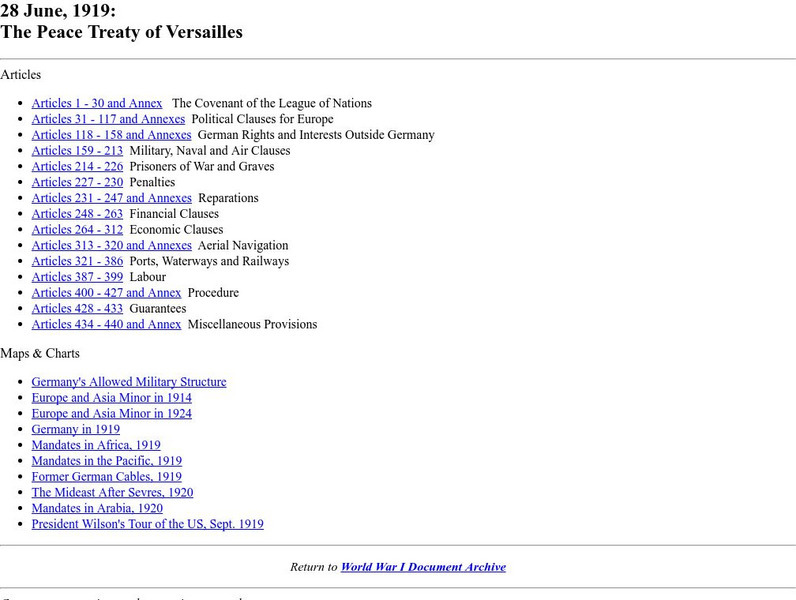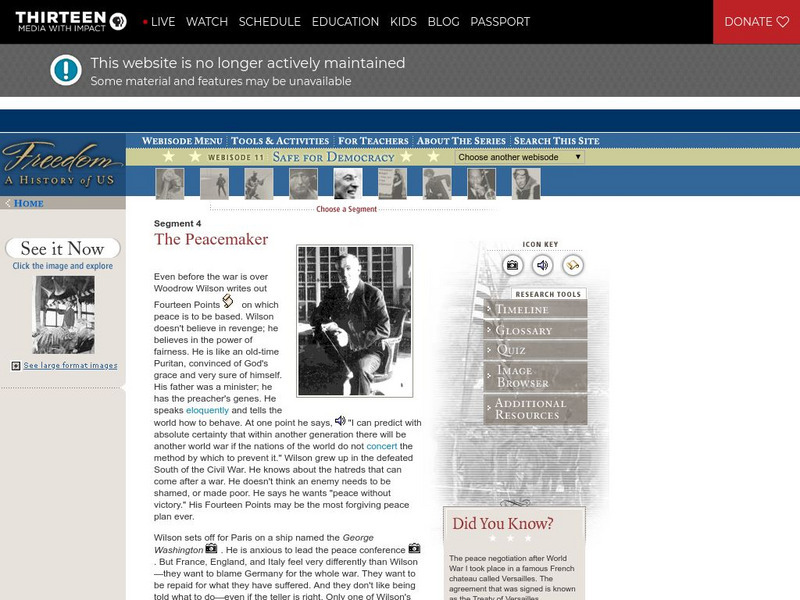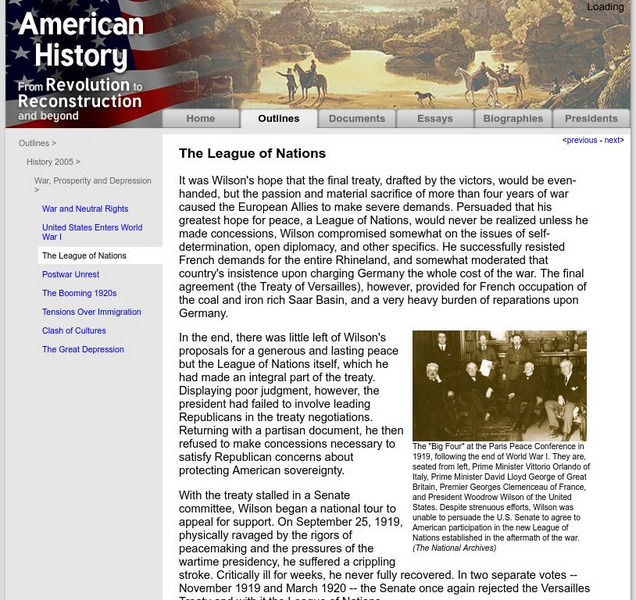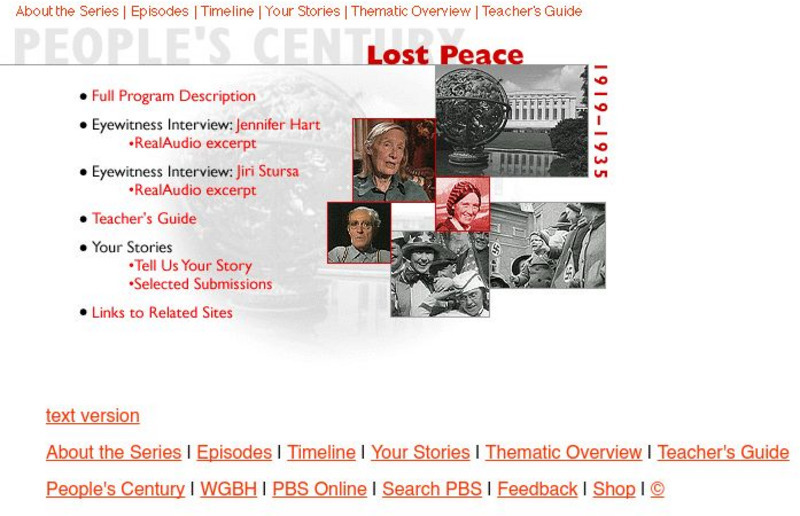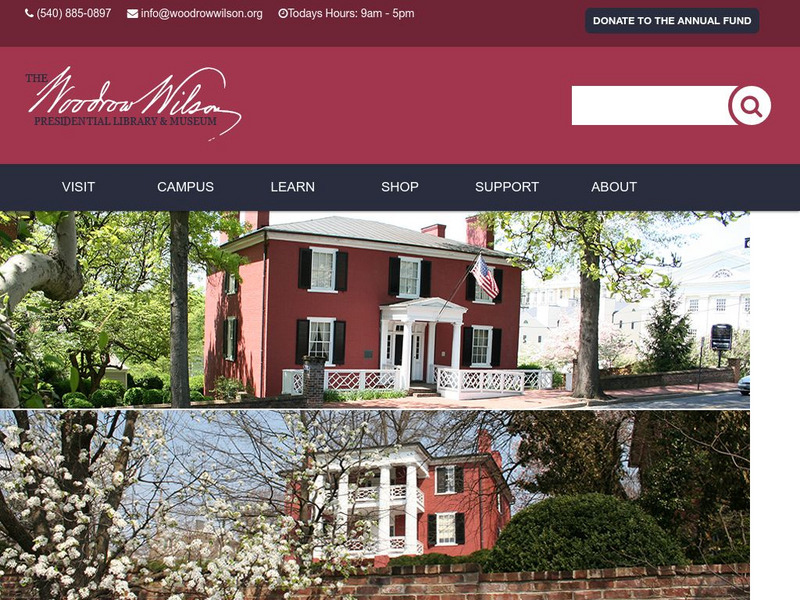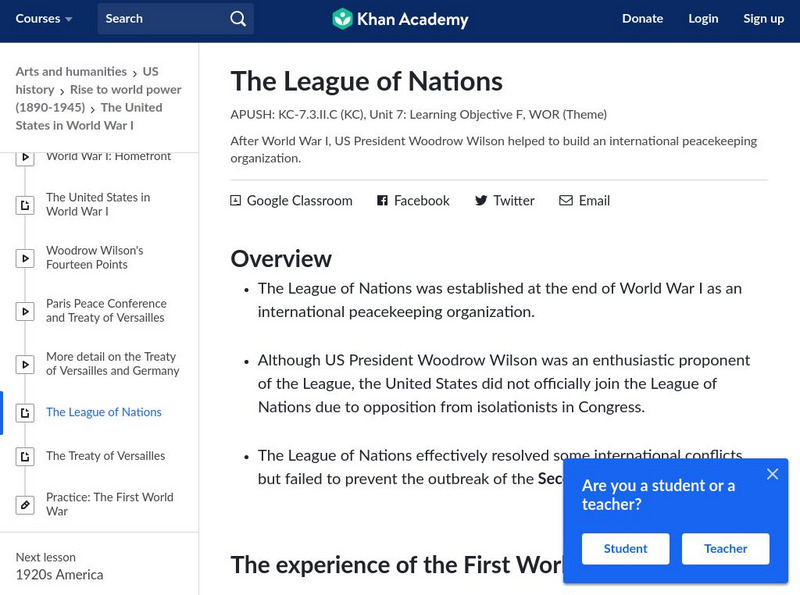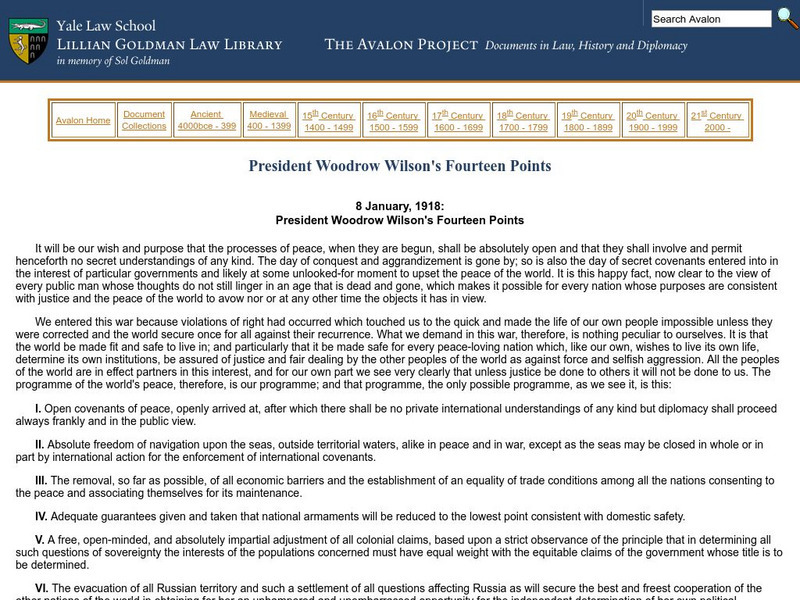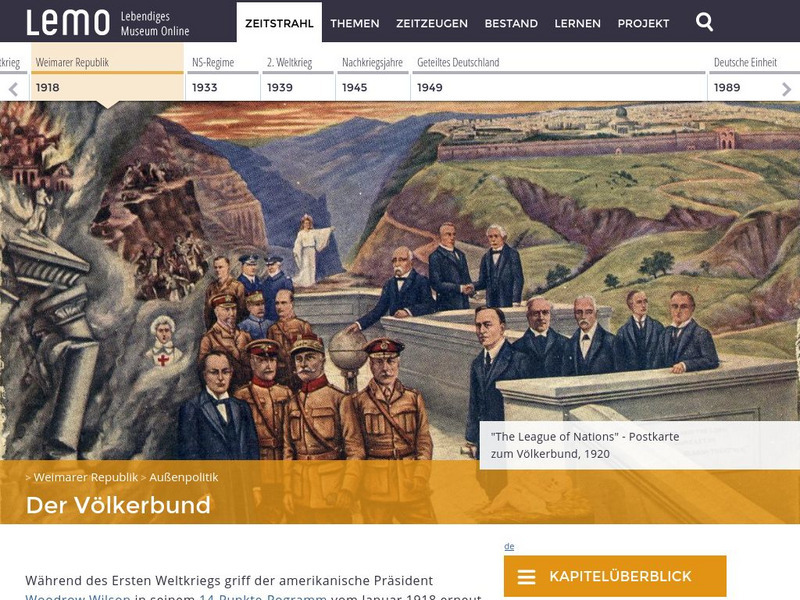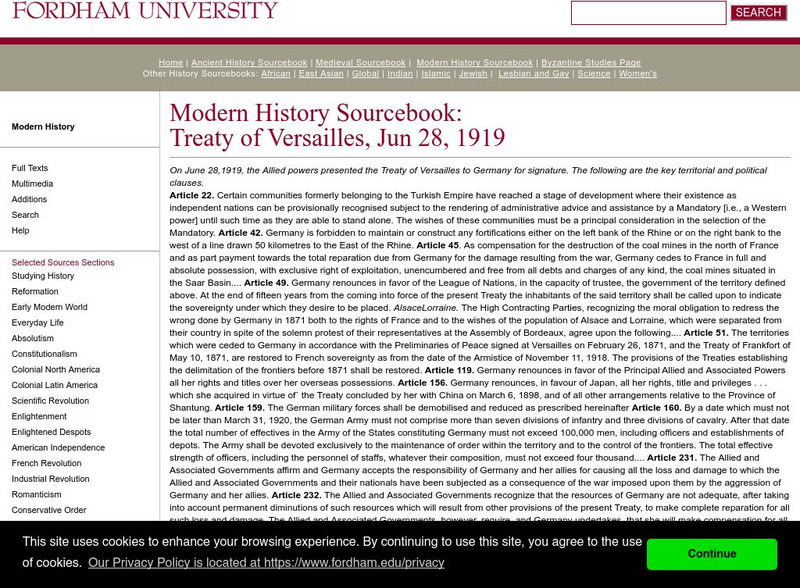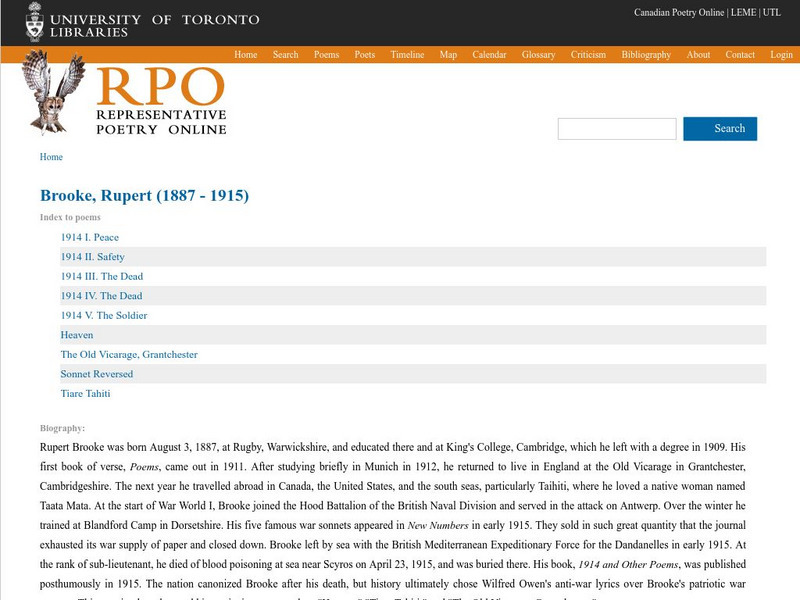Ducksters
Ducksters: World War I for Kids: Christmas Truce
Kids learn about the Christmas Truce of World War I when soldiers from both sides of the western front peacefully met in No Man's Land between the trenches and celebrated Christmas during the war.
Tom Richey
Tom Richey: 1920's Politics, Taxes, and Foreign Policy
Check out a comprehensive slideshow that dives into the key components of the American government which the people disagreed with following World War I.
The History Cat
The History Cat: Treaty of Versailles: Peace Returns
Describes what happened at the end of World War I - the celebrations and the unnecessary final battles - as the Big Four (France, Britain, the United States, and Italy) sat down to begin negotiations for the Treaty of Versailles....
Georgia Department of Education
Ga Virtual Learning: World History: The Years Between the Wars (1919 1939)
World History unit on the years between the two world wars, 1919-1939. Comprehensive multi-media resources, assignments, activities and assessment.
Ducksters
Ducksters: World War I for Kids: Fourteen Points
Kids learn about U.S. President Woodrow Wilson's Fourteen Points during World War. These were his war aims and goals to establish world peace in the future.
Brigham Young University
Byu: Wwi Document Archive: The Peace Treaty of Versailles: Articles 1 30
This site provides the complete texts of the Peace Treaty of Versailles as completed on June 28th, 1919. Also provided at the bottom of the page are many links to charts and maps that are associated with the Treaty.
Khan Academy
Khan Academy: Us History: 1890 1945: The Treaty of Versailles
The 1919 Treaty of Paris ended World War I, but imposed heavy penalties on Germany.
PBS
Wnet: Thirteen: Freedom: A History of Us: The Peacemaker
Find a document containing President Wilson's plan for peace after World War I, known as his Fourteen Points, as well as photographs with captions, and the audio of one of his speeches in which he lays out his ideas and garners support...
University of Groningen
American History: Outlines: The League of Nations
Overivew of the end of World War I, the Treaty of Versailles and the League of Nations.
Curated OER
Image From the Ending of World War One, and the Legacy of Peace
In-depth look at World War I. Includes summaries of the war years; sound clips of eye-witness accounts; virtual tours of trenches on the Western Front; maps; articles and overviews; and similar resources.
Digital History
Digital History: The Fourteen Points and the Versailles Treaty [Pdf]
President Woodrow Wilson, in his hope that World War I was the war to end all wars, issued his Fourteen Points almost one year before the end of the war as a bluepoint to guarantee peace across the world. Read a summary of the points and...
PBS
Pbs: Lost Peace
Two interesting interviews with eyewitnesses who were involved in two important events after World War I: The League of Nations and the German occupation of Czechoslovakia.
Other
Woodrow Wilson Presidential Library & Museum: The Fourteen Points
Learn about President Wilson's controversial Fourteen Point blueprint for world peace that became the basis for the Treaty of Versailles following World War I.
Khan Academy
Khan Academy: Ap Us History: 1890 1945: The Us in Wwi: The League of Nations
Discusses the background to establishing the League of Nations, its role in facilitating peace negotiations, and why it ultimately failed to prevent World War II. Explains why the United States never joined it and how the United Nations...
Yale University
Avalon Project: President Woodrow Wilson's Fourteen Points
This site provides a copy of Woodrow Wilson's speech of the Fourteen Points given during World War I.
PBS
Wnet: Thirteen: Freedom: A History of Us: The Peacemaker
Explore how President Wilson, in his Fourteen Points, urged peace without revenge European self-determination, and the establishment of a peace-keeping League of Nations politicians both abroad and at home rejected his plans.
Michigan State University
Michigan State University: Modern Balkan History: The Legacies of 1917 and 1919
An essay describing the impact of the War and the post war on the Balkan people. Discusses social and economic impacts. Also, goes into detail about post war events.
Independence Hall Association
U.s. History: The Treaty of Versailles and the League of Nations
President Wilson lobbied for a "just peace" for the end of World War I. Read about his Fourteen Points that he thought would accomplish this. See how his plans for a League of Nations and the final terms of the Treaty of Versailles...
Tom Richey
Tom Richey: The Versailles Treaty Controversy
Explore the agenda items put out to the United States during the end of World War I that are featured in this slideshow. Address the disillusionment the citizens had at the end of the war.
Other
Le Mo: 1918 1933 Der Volkerbund
Brief overview from LeMO of the founding and history of the League of Nations, which was formed as a consequence of the Treaty of Versailles, which officially ended World War I.
Internet History Sourcebooks Project
Fordham University: Modern History Sourcebook: Treaty of Versailles
This site from the Modern History Sourcebook gives the key highlights of the Versailles Treaty, especially involving territorial questions.
University of Toronto (Canada)
University of Toronto: Selected Poetry of Rupert Brooke
The site offers a brief biography of Brooke with a bibliography of his works. Of particular interest are the full texts of his "1914" poems: e.g., "Peace," "The Dead," and "Heaven."
PBS
Wnet: Thirteen: Freedom: History of Us: Safe for Democracy?: Wilson's 14 Points [Pdf]
A lesson plan from the producers of the 16-episode PBS series "Freedom: A History of US" that directs students to examine Woodrow Wilson's Fourteen Points. They will discuss how Wilson's plan and the establishment of the League of...
Curated OER
Bernard Baruch:advisor to Presidents in Both War & Peace
Brief biographical information on Bernard Baruch: financial adviser to President Wilson prior to and during World War I and financial adviser to Franklin Roosevelt prior to and during World War II.






